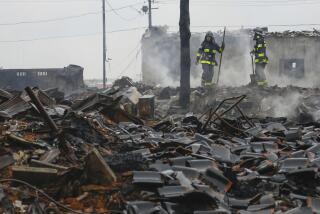Japan’s quake standards fall victim to greed
- Share via
MOST AMERICANS don’t associate Japan with shoddy craftsmanship or slipshod engineering. On the contrary, most of us admire the Japanese for making fuel-efficient automobiles that never rattle or quit; televisions and cameras that hardly ever malfunction; and sophisticated robots and cellphones stuffed with features that seem light-years ahead of our own. Indeed, Japan’s manufacturing ethic seems without parallel.
So it was rather shocking earlier this month to learn that flimsy construction and coverups led the government to send in the bulldozers and demolition crews to tear down a new 265-room business hotel in downtown Tokyo -- a 15-story ferroconcrete tower that had opened less than a year earlier.
The building authorities ordered the hotel knocked down because the architect who designed it, Hidetsugu Aneha, admitted falsifying data to hide the fact that not enough structural steel had been used to ensure the building would survive even a moderately strong earthquake. Indeed, subsequent tests showed that only 30% of the required reinforcements had been mounted.
Aneha explained to reporters that he had felt intense corporate pressure to cut design and construction costs. “I didn’t feel I was doing something wrong. I was too busy to feel that way,” he said.
Japan’s real estate sector has suffered more than a decade of lean times after the collapse of the nation’s “bubble economy” in 1990. Two other Tokyo-area hotels that Aneha designed for the Keio Electric Railway Co. will also be torn down, and 20 other buildings, as well as a dozen condominium complexes, may also be jeopardized.
What’s more, Aneha apparently was not the only one. Unfortunately for Japan, and for the shaky self-confidence of its people, a second architect, Ryoichi Asanuma, working on the northern island of Hokkaido, has told officials that he, too, faked quake-resistance data. His case involves 33 buildings in Sapporo, though officials are not yet certain those buildings are so weakened that they must be demolished as well.
The brewing scandal raises new questions about the government’s decision in 1998 to permit private firms, rather than government inspectors, to verify the safety and structural integrity of buildings. Yet a recent report by an advisory panel to the construction ministry declined to point an accusing finger at the government.
Certainly, other nations are not immune to such scandals. We Californians also have to wonder if we have been falsely reassured that our roads, hospitals and homes will actually survive the Big One. Construction of the new Bay Bridge in San Francisco, for instance, was briefly suspended last year amid allegations, later disproved, that some welds were substandard. And after a recent earthquake in Turkey, residents complained about obvious slipshod construction after many new buildings collapsed.
Yet in a nation where the presence of whistle-blowers and nongovernmental watchdog organizations is surprisingly weak, where newspapers seldom investigate corporate corruption and where social pressure to conform remains so strong, there is little to reassure Japanese citizens that the urban infrastructure of their earthquake-plagued nation is as safe and secure as they once reckoned -- especially because the government has historically been immersed in scandal.
Instead, the Japanese seemingly relied -- as usual -- on ritual apologies and ritualized suicide, without taking any serious new measures to change the system. Aneha’s wife and another architect -- who asked Aneha to calculate seismic data for him -- killed themselves after the scandal was disclosed. In Japan, suicide can bring a reverence not available in life, and, unlike in the United States, survivors are not usually denied the proceeds of life insurance policies.
It’s said that while American corporate criminals steal to enrich themselves, Japanese mainly steal for their companies. For decades, in fact, the government and the electorate seemed to tolerate bid-rigging, inflated consumer prices and payoffs to government officials. This was the lubricant that kept Japan Inc. running so smoothly, but the public’s health and safety never seemed endangered.
But, along with recent coverups associated with outbreaks of avian flu and mad cow disease, and the knowing distribution of HIV-tainted blood to hemophiliacs, the earthquake scandal makes us wonder whether a subtle line has now been crossed in Japan. Maybe after years of ceaseless recession, the duty to protect public safety finally has been undermined by a more common global propensity for greed and avarice.
Just this month, Toshiba Corp., which recently purchased the last U.S. manufacturer of nuclear power reactors, has admitted to falsifying data measuring how much water flowed through the operating systems of some of its nuclear power plants, a key measure of whether the system is functioning properly. Clearly, the general concern for public safety that we might have expected from large Japanese firms is in retreat.
The business of ensuring earthquake safety in Japan, a nation as seismically energetic as California, now appears to be rife with corruption and abuse.
More to Read
Sign up for Essential California
The most important California stories and recommendations in your inbox every morning.
You may occasionally receive promotional content from the Los Angeles Times.










